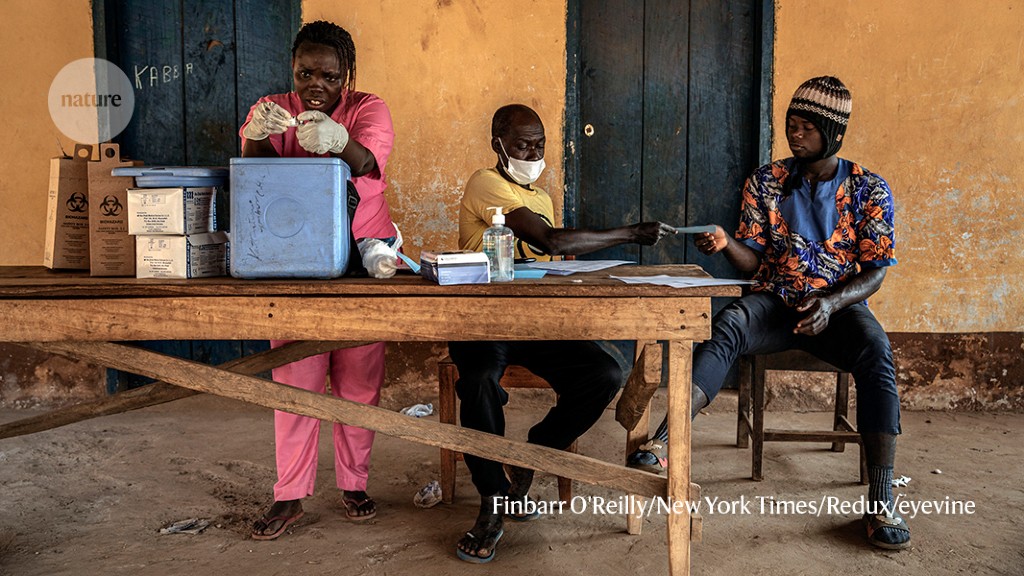Improved COVID-19 Vaccine Uptake in Rural Sierra Leone through Mobile Delivery
Główne pojęcia
The authors demonstrate that mobile delivery of COVID-19 vaccines in rural Sierra Leone significantly increased vaccination coverage, highlighting the importance of accessibility in healthcare services.
Streszczenie
The global distribution of COVID-19 vaccines faced disparities between high and low-income countries. In rural Sierra Leone, a study by Meriggi et al. published in Nature revealed that providing vaccines at temporary mobile clinics over a few days notably boosted vaccination rates compared to villages without such clinics. This approach emphasized the significance of proximity to essential health services for enhancing healthcare coverage.
Customize Summary
Rewrite with AI
Generate Citations
Translate Source
To Another Language
Generate MindMap
from source content
Visit Source
www.nature.com
Mobile delivery of COVID-19 vaccines improved uptake in rural Sierra Leone
Statystyki
The study showed that offering COVID-19 vaccines at temporary mobile clinics over two to three days substantially increased vaccination coverage.
Bringing essential health services closer to people lacking easy access is crucial for improving healthcare coverage.
Cytaty
Kluczowe wnioski z
by Alison Butte... o www.nature.com 03-13-2024
https://www.nature.com/articles/d41586-023-03186-0
Głębsze pytania
How can other low-income countries replicate the success of mobile vaccine delivery seen in Sierra Leone?
Other low-income countries can replicate the success of mobile vaccine delivery seen in Sierra Leone by implementing similar strategies tailored to their specific contexts. This includes conducting thorough community engagement and outreach to build trust, collaborating with local healthcare workers and organizations for efficient implementation, leveraging technology for appointment scheduling and tracking doses, ensuring cold chain logistics for vaccine storage, and providing adequate training for staff involved in administering vaccines. Additionally, governments should allocate sufficient resources and funding towards these initiatives to ensure sustainability.
What challenges might arise when implementing mobile vaccine clinics in rural areas?
Several challenges may arise when implementing mobile vaccine clinics in rural areas. These include logistical hurdles such as limited transportation infrastructure making it difficult to reach remote communities, inadequate storage facilities for vaccines requiring specific temperature conditions, scarcity of trained healthcare personnel available to administer vaccines, cultural beliefs or misinformation leading to hesitancy among the population, language barriers hindering effective communication about vaccination campaigns, and potential security concerns especially in conflict-affected regions. Overcoming these challenges requires careful planning, community involvement, flexibility in operations, and continuous monitoring and evaluation.
How can the concept of mobile healthcare be expanded beyond vaccinations to improve overall healthcare access globally?
The concept of mobile healthcare can be expanded beyond vaccinations to improve overall healthcare access globally by integrating various health services into a comprehensive mobile health delivery system. This includes offering preventive care such as screenings for diseases like diabetes or hypertension, maternal and child health services including antenatal care and immunizations, chronic disease management through regular follow-ups and medication refills on-site or via telemedicine consultations. Furthermore, mental health support could be provided through counseling sessions conducted remotely using digital platforms. By utilizing technology like telehealth apps or SMS reminders along with partnerships with local providers or NGOs operating on the ground level ensures sustainable expansion of mobile healthcare services worldwide.
0
